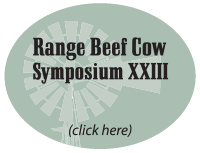Cow Herd Vaccination Choices
“Why do we vaccinate cattle?” asked Richard Linhart as he addressed producers gathered for an evening seminar Dec. 2 in Rapid City, S.D. The event, sponsored by Zoetis and Certified Angus Beef LLC (CAB), was a precursor to the three-day Range Beef Cow Symposium (RBCS) that kicked off in Rapid City Dec. 3.

Richard Linhart, technical services veterinarian for Zoetis, explained the difference between modified-live virus (MLV) vaccines and killed-virus vaccines.
What differentiates vaccines? Linhart noted that vaccines do differ based on antigens, adjuvants, duration of immunity, label claims, safety and even the reputation of the company.
Overall, Linhart told producers, “Vaccines are insurance policies, and you have to pick the right vaccine for the risk your herd is at.”
A big question that producers often must consider is the difference between modified-live virus (MLV) vaccines and killed-virus vaccines. He noted that killed vaccines are often “assumed” to be safer, but, he said, “Most of the reactions in cattle that we see are with killed vaccines.”
He added, “Killed vaccines don’t mimic the disease; immunity doesn’t typically last as long, and they are not as robust as a MLV.”
Linhart also explained that killed vaccines must be boosted, whereas MLV vaccines have less need for a booster.
He granted that MLV vaccines are often perceived as less convenient because they have to be mixed/activated before being administered.
 Linhart shared that if administered at the wrong time MLV vaccines can negatively affect pregnancy rates. However, he emphasized that if cattle receive the proper prebreeding vaccination protocol, there is no effect on pregnancy rates.
Linhart shared that if administered at the wrong time MLV vaccines can negatively affect pregnancy rates. However, he emphasized that if cattle receive the proper prebreeding vaccination protocol, there is no effect on pregnancy rates.“These vaccines (MLVs, like Bovi-Shield) are extremely safe and effective when used according to label directions. They are extremely risky when you don’t,” Linhart stated.
Linhart emphasized that his company’s MLV label directions instruct: To help ensure safety in pregnant cattle, heifers must receive at least two doses of any Bovi-Shield Gold FP® or PregGuard® Gold FP product, with the second dose administered approximately 30 days prebreeding.
Linhart underscored that reading and following label directions is imperative when it comes to using vaccines effectively. He also stressed the importance of involving a veterinarian in developing herd health and vaccination protocols for individual herds.






